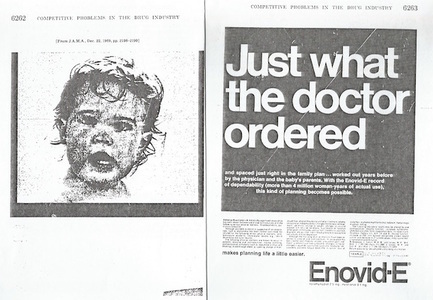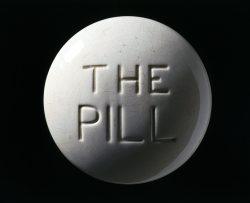Over the last several months I have been reading and writing about the Nelson Pill Hearings. I was hired by the late Karen Langhart to dig through 1500+ pages of congressional hearing transcripts. Her daughter, Erika, died of blood clots caused by hormonal birth control and Karen wanted to know what the researchers, the FDA, and Congress knew about the risks associated with these hormones back then. This matter is close to my heart because I suffered a stroke at the age of 28 caused by the pill. Could Karen’s daughter’s life, and the lives of so many other young women, have been spared had Congress and the FDA heeded the warnings of the researchers at these hearings? What was the result of all this government time and money? What was the point and what did the hearings lead to? Karen believed that if women and their doctors today fully understood what doctors back in 70s understood, fewer women would choose hormonal birth control and if they did, the risks would be understood and the side effects could be recognized and treated earlier.
Based on my personal experience, and the experience of many of the women helping with our research, doctors don’t understand the risks involved with hormonal birth control. And I think we need to ask why. The testimony given by both industry and non-industry physicians and researchers is pretty damning. The fact that the information presented at the hearings has been largely ignored is infuriating. Why did my ER doctors send me home from the hospital twice when I presented with the exact stroke symptoms testified about at the hearings? Why, over 45 years later, do we still have doctors doubting the dangers of hormonal birth control and misdiagnosing women or worse, dismissing them completely? Why do women continue to suffer from side effects ranging from mood swings to death? And why after all these years are there no better and safer options?
This is by no means a complete account, but below I’ve compiled some of the most interesting, and sometimes shocking, testimony from the Nelson Pill hearings.
What Are the Nelson Pill Hearings?
Senator Gaylord Nelson scheduled these congressional hearings back in 1970 after a number of reports, books (especially Barbara Seaman’s “The Doctors’ Case Against the Pill”), and studies brought up concerns about the safety of the birth control pill.
In his own words (page 5923):
The aim of these hearings: First, whether they [birth control pills] are dangerous for the human body and, second, whether patients taking them have sufficient information about possible dangers in order to make an intelligent judgement whether they wish to assume the risks.
I should note that it was the feminists who demanded the hearings, expressly because of the safety issues. Consider whether that would happen today?
Who Testified?
Doctors, scientists, and officials from the Food and Drug Administration testified over the course of two months. After the first few days of testimony, Senator Bob Dole implied that the hearings were biased against the pill, to which Senator Nelson responded (page 6021-6022):
These hearings will permit a presentation of all viewpoints respecting the pill, in the best balanced fashion that I know how… Every single company is invited, and if they want to have 5 days or 10 days, 8 hours a day, to present their case, I will give it to them if they want to come.
To this Nelson responded, “I stated in advance of the hearings that every viewpoint would be heard on this issue… There will be women who testify… I will give you all the time—if you ladies will come to see me—would you girls have a little caucus and decide which one will talk one at a time, we can then decide what ladies will testify. Your viewpoints will be heard, don’t worry about that.”
Senator McIntyre in defense of the activists said (page 6018):
I would like to say, Mr. Chairman, a few words in behalf of the young ladies who spoke up from the audience. The scientists we just heard this morning speak of side effects and drugs and so many reactions on so many thousands or hundreds of thousands of patients. However, I Think we should bear in mind, Mr. Chairman, the fact that for an individual who experiences a serious adverse reaction to the drug, her incidence is 100 percent. So, for this reason, Mr. Chairman, I hope we can arrange for at least one of these young ladies to be heard.
Even Dr. Louis Hellman, a doctor who had worked on projects funded by the pharmaceutical companies felt that the women should be heard. (page 6189):
Women use these drugs and it is important that they be presented in any decision-making body.
Yet the feminists were escorted from the hearings by security. None of them were allowed to give testimony. The only two women to testify at the hearings were doctors who championed the pill. So at these “fair and balanced” hearings, they heard from no one who had actually experienced side effects of the pill.
The Effects of the Pill
I’ve written about several of the side effects of the pill and included expert testimony and current research from stroke to weight gain to depression to loss of libido. But perhaps Dr. Victor Wynn put it most succinctly during his testimony (page 6311):
“All the disadvantages of this medication stem from the metabolic changes, whether they be changes in personality, whether they be changes in putting on weight, whether they be changes in skin pigmentation or what have you, high blood pressure… There are more than 50 ways in which the metabolic functions of the body are modified, and to say therefore that normal physiological function has been demonstrated in the years of oral contraception is to overlook a very large amount of information.”
What our research from the Birth Control and Blood Clots study has found so far is that it is not simply a matter of if a patient will experience these side effects, but when. I had been using hormonal birth control for 10 years before I had a stroke. And I was told that was rare. It turns out that it’s not so rare. And Dr. Victor Wynn agreed (page 6303):
When I say these changes occur, I mean they occur in everybody, more in some than in others, but no person entirely escapes from the metabolic influence of these compounds. It is merely that some manifest the changes more obviously than others.
Which makes what Dr. Joseph Goldzieher said all the more chilling (page 6353):
“What is an acceptable risk of death from a pill? There is no simple answer to this question.”
I disagree. The risk of death is not an acceptable tradeoff for birth control.
Communicating Risk: Researchers, Doctors, Patients
As Senator Nelson said, one of the roles of the hearings was to determine if women were being given sufficient warning information about the dangers of the pill so that they might make an educated decision about whether to use it. You can read more about how risk is communicated with regard to hormonal birth control here.
Communication by Researchers
Edmond Kassouf gave some of the most interesting and alarming testimony of any of the doctors at the hearings. On page 6114 and 6115 he says:
On September 30, 1968, the lead article in the JAMA was “Oral contraceptives and thromboembolic disease.” It was written by Dr. Victor Drill and David Calhoun of the G.D. Searle Co. They concluded that U.S. data did not reveal a clotting or death risk. This paper is unique, being in effect, a major policy statement by the manufacturer on the safety of their own drug, which is in contention.
Dr. Kassouf makes an excellent yet disturbing point. For the first time, the pharmaceutical company is making the judgment call about whether their own product is safe. Here we see the very company that stands to profit from downplaying the risks of using hormonal contraceptives doing just that. And I dare say, they’ve been doing it ever since.
Communication to Doctors
Not only is the pharmaceutical industry doing the research, drawing the conclusions, and publishing the results, but they are also marketing directly to doctors. Dr. J. Harold Williams (page 6261) testified about these advertising materials.
A photograph of a beautiful child on the left hand side, and on the right hand side in big bold letters ‘Just what the doctor ordered.’ Now, how God-like can you get, gentlemen? In smaller print, ‘And spaced just right in the family plan, worked out years before by the physician,’ and oh yes, ‘The baby’s parents.’ I find it disgusting that this kind of appeal has to be made to American physicians to wheedle them into prescribing the pill for millions of women. If the pill is as good as they say it is, and if it is as safe as they say it is, that kind of advertising would not be necessary.
Communication to Patients
After much of the testimony, you can almost hear the frustration in Senator Nelson’s voice as he points out how women are being misled. Senator Nelson to Dr. Guttmacher (page 6610):
The literature that is going out is inaccurate. It is misleading 8,500,000 women in this country and it had been doing it for 10 years. It has not been corrected by the Food and Drug Administration, it has not been corrected by the medical profession; it has not been refuted by anybody. Here it stands. You refute it; I reject it. You would not use this in your clinics. Yet it is being passed to women all over the country. At what stage do you consider the women’s rights?
False Promises- The Results of The Nelson Pill Hearings
So what was the result of these hearings?
Senator Nelson (page 6486):
My own view is that, as a result of these hearings, we are going to see a substantial increase in the research moneys allocated for the improvement of oral contraceptives, and research into other methods of contraception.
I think all those I have talked to who have been working in the field would agree that the oral contraceptive now on the market is a sort of crude, first generation contraceptive and that we have not done enough research… So I am hopeful that out of all this, we will get a substantial increase, as I think we will, in research funds.
But what happened to all of that funding? Do we have better research now? If you’ve read any of my other articles about the side effects of hormonal birth control, you will find a similar theme. Every time I’ve looked into a health problem associated with hormonal contraception, the most recent studies still call for more research. How is it that we’ve been needing more research on this medication for nearly 50 years and we can still draw no conclusions? Perhaps Dr. Paul Meier illuminated part of the problem in his testimony (page 6553-6554):
Of far greater concern to me is the failure of our governmental agencies to exercise their responsibilities in seeing to it that appropriate studies were carried out… Frankly, the required research, although important, is not especially appealing to scientists. It is not fundamental and it is not exciting. It is difficult, it is expensive, and it is fraught with the risk of attack from all sides.
Evidently, for whatever reasons, there is no sound body of scientific studies concerning these possible effects available today, a situation which I regard as scandalous. If we proceed in the future as we have in the past, we will continue to stumble from one tentative and inadequately supported conclusion to another, always relying on data which come to hand, and which were not designed for the purpose.
So where is all this promised research that was called for at these hearings? One of the only things nearly every expert that testified agreed upon was that there needed to be more and better research. And that the birth control pill would and should be replaced by something better. Dr. Guttmacher (page 6616):
I think the two methods, the pill and the intrauterine device, have been significant contributions. I think we are still in the horse and buggy day of effective contraception. I am optimistic in feeling that in 5 years, we shall have methods that are infinitely superior and safer than either.
Where are these methods? Surely, it’s not the ring nor the patch which have proven to be even more dangerous than the pill? Or the shot which is also used as chemical castration for sex offenders? Or the implant which comes with all of the side effects of the pill but also pain, swelling, scarring, bruising at the area where it is placed? What happened to the promised funding? What happened to the requested research? What happened to communicating more effectively to patients? What happened to protecting women?
What Now?
So many women have lost their lives because of these medications. I was nearly one of them. The promises of these hearings—better communication, more conclusive research, safer alternatives—have never materialized. We cannot rely on research conducted by the pharmaceutical companies or policies developed by politicians paid by the pharmaceutical industry. They have made it clear time and time again that they are not in the business of protecting people. They continue to demonstrate that profit takes precedent over human life. So, now it’s up to us. We need to do the research, spread the awareness, and speak out. We need to demand safer alternatives. Fighting for reproductive freedom should not come at the expense of our health and safety. It should not come at the expense of our lives. Women were literally dying from the pill back then. The feminists of the 1970s knew they had to speak out. Women are STILL dying from hormonal birth control. Why are the feminists not speaking out now?
Why have we relinquished our health and safety for convenience?
We Need Your Help
More people than ever are reading Hormones Matter, a testament to the need for independent voices in health and medicine. We are not funded and accept limited advertising. Unlike many health sites, we don’t force you to purchase a subscription. We believe health information should be open to all. If you read Hormones Matter, like it, please help support it. Contribute now.
Yes, I would like to support Hormones Matter.
Photo by Johnny Cohen on Unsplash.















